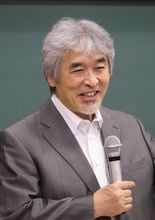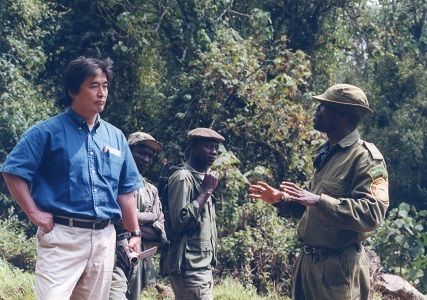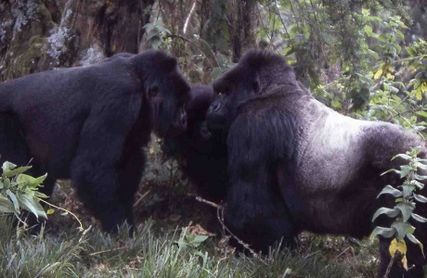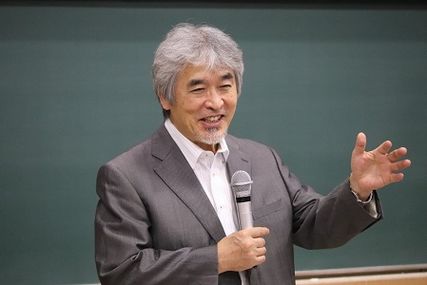Interview with Juichi Yamagiwa, new Director-General of the Research Institute for Humanity and Nature

In April 2021, the Research Institute for Humanity and Nature (RIHN) welcomed Juichi Yamagiwa as its fourth director-general. A veteran primatologist, Yamagiwa says he hopes to explore and solve global environmental issues by utilizing the insight and perspective he gained over the years. Kim Satbyul, Specially Appointed Assistant Professor, asked Professor Yamagiwa about his aspirations as director-general and the roles the humanities are required to play for environmental issues.
Learning about humans through primatology
Kim: Please tell us about your previous research projects.
Yamagiwa: Primatologists say that to learn about humans, one should study apes. This way of thinking inspired me to pursue the field. Trying to base my research around humans and society, I first focused on father-child relationships. Mothers naturally develop a close connection with their offspring as they become pregnant and give birth. But since fathers do not gestate, they have no innate understanding of the blood relation or intimate tie between them and their child. This prompted me to explore how fathers develop and maintain relationships with their young.
I eventually came to the idea that males do not become fathers at their own will; rather, they are created as sociological fathers. They start to behave in ways that meet the expectations of others, as the female counts upon the male to serve fatherly roles and the infant grows attached to the male as its paternal parent. In other words, fathers are the first cultural apparatus that humans have ever developed.


During the COVID-19 pandemic, I have been thinking about how a society, like that of humans, requires three types of freedom: the freedom to move, gather, and converse—none of which is seen among gorillas. I think obtaining these freedoms has enabled humans to develop a highly plastic and large-scale society. How humans came to gain these kinds of freedoms is a topic that I am currently exploring.
From primatology to global environmental Issues: Perspectives from extensive time and spatial bases
Kim: When thinking about global environmental issues, I guess it helps to consider time from a macro viewpoint to understand human evolution, and also to adopt a broad perspective by bringing non-human organisms into the equation.
Yamagiwa: I think the perspective I gained through my studies in primatology—perhaps more so than primatology itself—will remain useful for me going forward. Through my research, I learned that we cannot understand humans in a superficial manner. Deeply embedded in our humanity is the evolutionary process, and we are interconnected with diverse living and non-living things. Observations on gorillas in the jungle revealed how the species evolved in an environment that is seamlessly connected to various plants and animals. Humans coexisted with many different forms of life for around seven million years, but this connection has been lost for the past 10 thousand years or so. Capitalizing on science and technology, we have been shortsightedly developing an environment beneficial for our own kind while breaking ties with the natural world.
This could lead to dire consequences. Japanese has the somewhat comical expression—kaze ga fukeba okeya ga mōkaru—“when the wind blows, dust in the eyes increases the number of blind people, the profession of blindness is shamisen, then many cats used for the strings can be caught, and when the cats are gone, the mouse bites the barrel, and finally the barrel makers flourish,” is shorthand for the way certain events can indirectly impact seemingly unrelated events—the “butterfly effect” from a scientific point of view. And this is starting to happen in real life today. To give you an example, if we do not stop climate change, which currently is a major challenge for humanity, some parts of the world will suffer earthquakes, tsunamis, heavy rainfall, and droughts. The phenomena that occur may initially be minor, causing little damage, but their negative impact will compound through a knock-on effect and eventually come to significantly affect humans. Restoring our connection with nature and its cycle is a critical point that needs to be discussed for the future of the global environment, and a task that the RIHN must take on.
The humanities value diversity, the natural sciences prize universality, and primatology bridges the gap between the two
Kim: I graduated from the cultural anthropology department of a university in South Korea. The school had a physical anthropology division where I studied how humans evolved from anthropoids. I was and am still puzzled by how cultural anthropology and physical anthropology seem to be polar opposites. The former values individuality and diversity, and at its core lies constructionism, whereas the latter is predicated on the universality of humans. I noticed that you have been talking more about universality in our interview today.
Yamagiwa: From a macro perspective, anthropology—and the humanities in general, for that matter—value diversity. The natural sciences, in contrast, pursue universality. There’s a gap between these two fields.
But humans and all living organisms have both diverse and universal aspects. The differences among us stand out when we focus on culture. On the flip side, comparing ourselves with other species like gorillas allows us to see the universality in us. This contradiction is a strange yet fascinating characteristic of us humans.
Kim: Your idea that fathers are a cultural apparatus can potentially bridge the humanities and the natural sciences.
Yamagiwa: Indeed. We are now starting to understand that what cultural anthropologists previously considered to be products of culture actually have deep ties with our biological qualities.

The significance of and challenges in the humanities in solving global environmental issues
Yamagiwa: I served as the president of the Science Council of Japan until fiscal year 2020. During the final two years of my tenure, I called on scholars from all manner of fields to predict what our world would look like in a decade and three decades, consider what academia can offer as we head toward that future, and, accordingly, compiled the result into a book.
Through this experience, I came to think that scholars of the humanities and social sciences cannot shape the future. They dislike predicting what lies ahead; they think it’s impossible to make guesses. For instance, while history and philosophy scholars reflect on the past and make suggestions for righting the status quo, they do not speculate about the future.
Kim: Is that because to predict the future, one needs to accept to some extent that human traits are universal?
Yamagiwa: That’s right. The natural sciences revolve around the accumulation of facts, allowing for people to guess the future and set goals; expecting, for instance, that certain creations would be brought about by certain technological advances. This explains why we saw far too many technology-pursuing policies in the latter part of the twentieth century.
But as we entered the new millennium, we started to realize that this way of thinking was mistaken. We need to reverse the negative legacy left behind by the previous technology-prioritizing age. And, to that end, scholars of the humanities and social sciences must properly outline a route that guides us into the future, and the humanities, the social sciences, and the natural sciences need to stand united—in a genuine sense—to accumulate their efforts by painting a composite picture of our future society. This, I believe, is the role RIHN should serve.
(Interviewer: KIM Satbyul, Liberal Arts Communicator, Specially Appointed Assistant Professor, Research Institute for Humanity and Nature)
Director-General of the International Research Center for Japanese Studies
